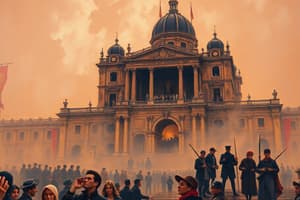Podcast
Questions and Answers
What significant change in governance occurred when William and Mary II ascended the throne?
What significant change in governance occurred when William and Mary II ascended the throne?
- The introduction of absolute monarchy
- The limitation of royal authority (correct)
- The dissolution of Parliament
- The establishment of a dictatorship
Which document played a crucial role in establishing Parliament's supremacy during William and Mary II's reign?
Which document played a crucial role in establishing Parliament's supremacy during William and Mary II's reign?
- The Magna Carta
- The English Bill of Rights (correct)
- The Act of Union
- The Declaration of Independence
What philosophical idea suggests that the human mind is shaped by experiences?
What philosophical idea suggests that the human mind is shaped by experiences?
- Empiricism
- Tabula Rasa (correct)
- Functionalism
- Rationalism
Which of the following best represents the influence of French philosophes?
Which of the following best represents the influence of French philosophes?
How did reasoning contribute to the understanding of God according to the ideas presented?
How did reasoning contribute to the understanding of God according to the ideas presented?
What principle is emphasized in laissez-faire economics regarding individual actions?
What principle is emphasized in laissez-faire economics regarding individual actions?
Which role is NOT typically associated with government in a laissez-faire economic system?
Which role is NOT typically associated with government in a laissez-faire economic system?
What is a critical outcome of individuals operating out of self-interest in an economic context?
What is a critical outcome of individuals operating out of self-interest in an economic context?
How does increased literacy among the upper class influence societal norms?
How does increased literacy among the upper class influence societal norms?
What consequence arises from a lack of government regulation in a laissez-faire economy?
What consequence arises from a lack of government regulation in a laissez-faire economy?
Which concept suggests that the government should balance power among its branches?
Which concept suggests that the government should balance power among its branches?
What did Voltaire notably attack in his writings?
What did Voltaire notably attack in his writings?
What is the central idea of Rousseau's 'The Social Contract'?
What is the central idea of Rousseau's 'The Social Contract'?
In 'Candide,' what societal issues does Voltaire portray as corrupt?
In 'Candide,' what societal issues does Voltaire portray as corrupt?
Which idea refers to individuals living free and innocent in nature, only to be corrupted by society?
Which idea refers to individuals living free and innocent in nature, only to be corrupted by society?
What educational approach is emphasized in Rousseau's 'Emile'?
What educational approach is emphasized in Rousseau's 'Emile'?
What statement best describes the 'General Will' in Rousseau's philosophy?
What statement best describes the 'General Will' in Rousseau's philosophy?
What is a potential consequence of private property, according to Rousseau?
What is a potential consequence of private property, according to Rousseau?
What conditions were required for someone to be elected to the Estates General?
What conditions were required for someone to be elected to the Estates General?
What was the significance of the Fall of the Bastille on July 14, 1789?
What was the significance of the Fall of the Bastille on July 14, 1789?
What triggered the Great Fear during the French Revolution?
What triggered the Great Fear during the French Revolution?
What was a primary demand made by the peasants during the Revolutionary period?
What was a primary demand made by the peasants during the Revolutionary period?
What did the Declaration of the Rights of Man and Citizen establish?
What did the Declaration of the Rights of Man and Citizen establish?
How did the King respond to the Declaration of the Rights of Man and Citizen?
How did the King respond to the Declaration of the Rights of Man and Citizen?
What actions did the women of Paris take in response to bread shortages?
What actions did the women of Paris take in response to bread shortages?
What led to the abolition of feudalism during the French Revolution?
What led to the abolition of feudalism during the French Revolution?
What significant change was made regarding King Louis XVI's position if he left the country for more than two months?
What significant change was made regarding King Louis XVI's position if he left the country for more than two months?
Which of the following groups had the most deputies in the Legislative Assembly?
Which of the following groups had the most deputies in the Legislative Assembly?
What was one of the leading reasons for the Parisian uprising against the government in August 1792?
What was one of the leading reasons for the Parisian uprising against the government in August 1792?
In the context of the French Revolution, who were the Jacobins and Girondins?
In the context of the French Revolution, who were the Jacobins and Girondins?
Why did France face challenges in their war against Austria?
Why did France face challenges in their war against Austria?
What was the consequence of the September Massacre concerning the prisoners in Paris?
What was the consequence of the September Massacre concerning the prisoners in Paris?
Who was Mirabeau in the context of the events described?
Who was Mirabeau in the context of the events described?
What was a primary demand of the Parisians during their uprising?
What was a primary demand of the Parisians during their uprising?
What was one of the consequences of Louis XVI's decision to restore the parlements?
What was one of the consequences of Louis XVI's decision to restore the parlements?
Which financial strategy did Necker utilize in an attempt to manage France's debt?
Which financial strategy did Necker utilize in an attempt to manage France's debt?
What was one of the major reforms proposed by Calonne regarding taxation?
What was one of the major reforms proposed by Calonne regarding taxation?
What was one of Brienne's main proposals to address France's financial issues?
What was one of Brienne's main proposals to address France's financial issues?
Which group did the Assembly of Notables consist of?
Which group did the Assembly of Notables consist of?
What realization did the nobles have regarding the Estates General?
What realization did the nobles have regarding the Estates General?
What led the third estate to gain more representation in the Estates General?
What led the third estate to gain more representation in the Estates General?
What was a significant economic condition leading to the French Revolution?
What was a significant economic condition leading to the French Revolution?
What was the consequence of the financial decisions made by both Necker and Calonne?
What was the consequence of the financial decisions made by both Necker and Calonne?
How did the financial crisis influence the dynamics between the royal government and the parlements?
How did the financial crisis influence the dynamics between the royal government and the parlements?
Flashcards
English Bill of Rights
English Bill of Rights
The English Bill of Rights (1689) established Parliament's power and restricted royal authority, leading to a constitutional monarchy.
Glorious Revolution
Glorious Revolution
The Glorious Revolution transferred the English throne to William and Mary, replacing James II, and solidifying Parliament's power.
Locke's 'Blank Slate' Theory
Locke's 'Blank Slate' Theory
Locke argued the human mind starts blank and is shaped by experiences, leading to good or bad morals.
Locke's view on Reason and God
Locke's view on Reason and God
Signup and view all the flashcards
Locke's Influence on French Philosophes
Locke's Influence on French Philosophes
Signup and view all the flashcards
Laissez-Faire Economics
Laissez-Faire Economics
Signup and view all the flashcards
Individual Self-Interest
Individual Self-Interest
Signup and view all the flashcards
Competition
Competition
Signup and view all the flashcards
Supply and Demand
Supply and Demand
Signup and view all the flashcards
Limited Government Role
Limited Government Role
Signup and view all the flashcards
Checks and Balances
Checks and Balances
Signup and view all the flashcards
Individual Liberties
Individual Liberties
Signup and view all the flashcards
Letters on the English
Letters on the English
Signup and view all the flashcards
Social Contract Theory
Social Contract Theory
Signup and view all the flashcards
Noble Savages
Noble Savages
Signup and view all the flashcards
General Will
General Will
Signup and view all the flashcards
Candide
Candide
Signup and view all the flashcards
Emile
Emile
Signup and view all the flashcards
Salons
Salons
Signup and view all the flashcards
Unequal Taxation
Unequal Taxation
Signup and view all the flashcards
High National Debt
High National Debt
Signup and view all the flashcards
Failed Harvests and Famine
Failed Harvests and Famine
Signup and view all the flashcards
Louis XVI's Approach
Louis XVI's Approach
Signup and view all the flashcards
Necker's Debt Management
Necker's Debt Management
Signup and view all the flashcards
Calonne's Attempts
Calonne's Attempts
Signup and view all the flashcards
Calonne's Tax Reform
Calonne's Tax Reform
Signup and view all the flashcards
Brienne's Failed Reform
Brienne's Failed Reform
Signup and view all the flashcards
Estates General Voting
Estates General Voting
Signup and view all the flashcards
Legislative Assembly
Legislative Assembly
Signup and view all the flashcards
Moderates
Moderates
Signup and view all the flashcards
Jacobins
Jacobins
Signup and view all the flashcards
Girondins
Girondins
Signup and view all the flashcards
King's Escape to Varennes
King's Escape to Varennes
Signup and view all the flashcards
September Massacre
September Massacre
Signup and view all the flashcards
France Goes to War Against Austria
France Goes to War Against Austria
Signup and view all the flashcards
Swiss Guard
Swiss Guard
Signup and view all the flashcards
French Revolution
French Revolution
Signup and view all the flashcards
August Tenth Insurrection
August Tenth Insurrection
Signup and view all the flashcards
What was the Estates General?
What was the Estates General?
Signup and view all the flashcards
Why was the storming of the Bastille important?
Why was the storming of the Bastille important?
Signup and view all the flashcards
What was the "Great Fear"?
What was the "Great Fear"?
Signup and view all the flashcards
What was the National Assembly?
What was the National Assembly?
Signup and view all the flashcards
What was the Declaration of the Rights of Man?
What was the Declaration of the Rights of Man?
Signup and view all the flashcards
What was the significance of the bread shortages?
What was the significance of the bread shortages?
Signup and view all the flashcards
When was the French Revolution and what were its main events?
When was the French Revolution and what were its main events?
Signup and view all the flashcards
Why did the French Revolution abolish feudalism?
Why did the French Revolution abolish feudalism?
Signup and view all the flashcards
Study Notes
The Enlightenment
- Scientists during the 1500s-1600s developed theories that separated the universe from God. Applying natural laws to society was a common thought.
- Towns and cities grew in size during the late 1600s and early 1700s, with advancements in technology.
- Peasant life during the Enlightenment was marked by illiteracy, social segregation from the upper classes, and limited belongings. They primarily ate bread.
- Aristocrats had lifestyles focused on excessive displays of wealth in clothes, food, and appearance.
Two Treatises of Civil Government
- Human nature is good and characterized by natural rights like liberty, property, and life.
- Society should have a social contract with leaders, and if the people are unhappy, they can legally rebel. This idea was a key component of the Glorious Revolution (1688-1689).
- The Glorious Revolution was a peaceful overthrow of King James II in England due to fears of a Catholic dynasty and his attempts to bypass Parliament. This event led to a constitutional monarchy and limited the power of the King.
Enlightenment Thinkers
- John Locke: Argued that human minds are blank slates shaped by interactions, and that reasoning leads to happiness.
- Montesquieu: Developed an analysis of government that connected it to climate and geography, arguing for separated powers in a republic, that balanced power in the government.
- Voltaire: Criticized aristocracy, emphasizing individual liberties like freedom of speech and religion in his writing.
- Rousseau: Believed in natural human goodness that is corrupted by society, especially through private property and social organizations. Advocated for the "Social Contract" and the General Will of the people.
- Emile: A program to develop a person fully, both physically and intellectually by experiencing nature to better oneself.
- Adam Smith: Explained the wealth of nations that focused on competition by not dictating by the government and consumers being involved.
The Causes of the French Revolution
- France was burdened with debt from wars, particularly supporting the American Revolution.
- Louis XVI's efforts to reform the tax system faced resistance from the nobility and existing governmental systems.
- Tax increases and growing economic hardship led to widespread discontent among the lower classes.
- The Assembly of Notables rejected proposed taxation reforms, and resistance from the established power structures led to the convocation of the Estates-General.
- The Estates-General was a meeting of representatives from the three estates of French society (clergy, nobility, and commoners). Failure to address growing inequality caused conflict.
- The storming of the Bastille on July 14, 1789, marked a turning point, highlighting the growing unrest and signaling the beginning of the French Revolution.
The French Revolution
- The absolute monarchy was overthrown as revolution spread from Paris to the countryside.
- Peasants revolted and destroyed feudal records, demanding cheaper bread and reduced taxes.
- The Declaration of the Rights of Man and Citizen was made, emphasizing individual rights and equality.
- The French Revolution went through various phases (e.g., the Reign of Terror).
- The monarchy was abolished, and France declared a republic.
- Bread shortages and economic hardship were major factors in driving the revolution.
- Women also participated in the protests, demanding relief from food shortages.
The Directory
- A new French constitution established a two-house legislature and a five-person executive Directory, trying to replace the chaos of earlier phases of the revolution.
- The Directory struggled with economic and political instability, ultimately paving the way for Napoleon's rise to power..
Studying That Suits You
Use AI to generate personalized quizzes and flashcards to suit your learning preferences.




